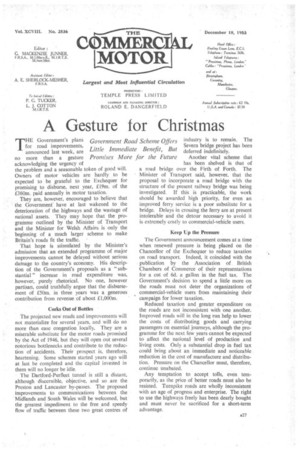A Gesture for Christmas
Page 29

If you've noticed an error in this article please click here to report it so we can fix it.
THE Government's plans for road improvements, announced last week, are no more than a gesture acknowledging the urgency of the problem and a seasonable token of good will. Owners of motor vehicles are hardly to be expected to be grateful to the Exchequer for promising to disburse, next year, £19m. of the Balm. paid annually in motor taxation.
They are, however, encouraged to believe that the Government' have at last wakened to , the deterioration of the highways and the wastage of national assets. They may hope that the programme outlined by the Minister of Transport and the Minister for Welsh Affairs, is only the beginning of a much larger scheme to make Britain's roads fit the traffic. '
That hope is stimulated by the Minister's admission that an extended programme of major improvements cannot be delayed without serious damage to the country's economy. His description of the Government's proposals as a " substantial " increase in road expenditure was, however, purely rhetorical. No one, however partisan, could truthfully argue that the disbursement of 00m. in three years was a generous contribution from revenue of about £1,000m.
Corks Out of Bottles The projected new roads and improvements will not materialize for several years, and will do no more than ease congestion locally. They are a miserable substitute for the motor roads promised by the Act of 1946, but they will open out several notorious bottlenecks and contribute to the reduction of accidents. Their prospect is, therefore, heartening. Some schemes started years ago will at last be completed and the capital invested in them will no longer be idle.
The Dartford-Purfleet tunnel is still a distant, although discernible, objective, and so are the Preston and Lancaster by-passes. The proposed improvements to communications between the Midlands and South Wales will be welcomed, but the greatest impediment to the free and speedy flow of traffic between these two great centres of Industry is to remain. The Severn bridge project has been deferred indefinitely.
Another vital scheme that has been shelved is that of a road bridge over the Firth of Forth. The Minister of Transport said, however, that the proposal to incorporate a road bridge with the structure of the present railway bridge was being investigated. If this is practicable, the work should be awarded high priority, for even an improved ferry service is a poor substitute for a bridge. Delays in crossing the ferry are at present intolerable and the detour necessary to avoid it is extremely costly to commercial-vehicle users.
Keep Up the Pressure The Government announcement comes at a time when renewed pressure is being placed on the Chancellor of the Exchequer to reduce taxation on road transport. Indeed, it coincided with the publication by the Association of British Chambers of Commerce of their representations for a cut of 6d. a gallon in the fuel tax. The Government's decision to spend a little more on the roads must not deter the organizations of commercial-vehicle users from maintaining their campaign for lower taxation.
Reduced taxation and greater expenditure on the roads are not inconsistent with one another. Improved roads will in the long run help to lower the costs of distributing goods and carrying passengers on essential journeys, although the programme for the next few years cannot be expected to affect the national level of production and living costs. Only a substantial drop in fuel tax could bring about an immediate and noticeable reduction in the cost of manufacture and distribution. Pressure on the Chancellor must, therefore, continue unabated.
Any temptation to accept tolls, even temporarily, as the price of better roads must also be resisted. Turnpike roads are wholly inconsistent with an age of progress and enterprise. The right to use the highways freely has been dearly bought and must never be sacrificed for a short-term advantage.




























































































